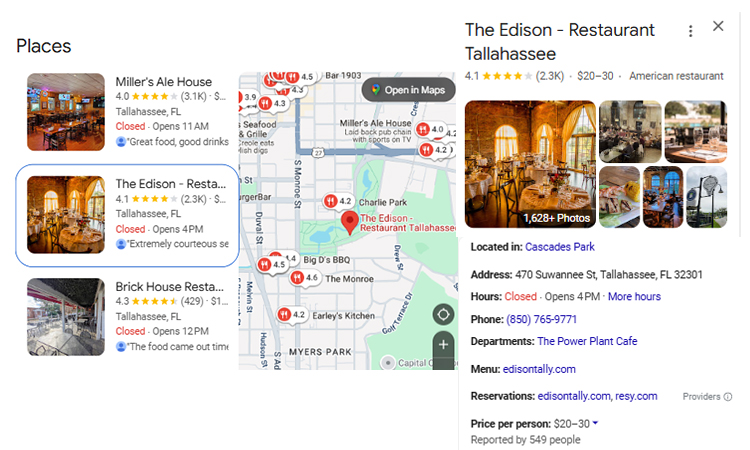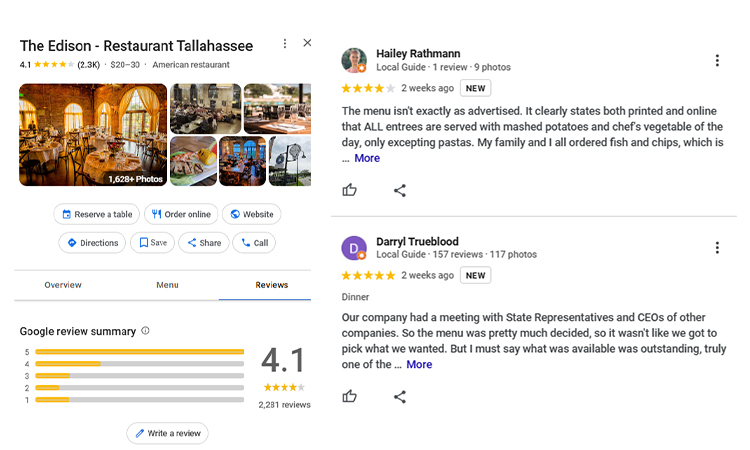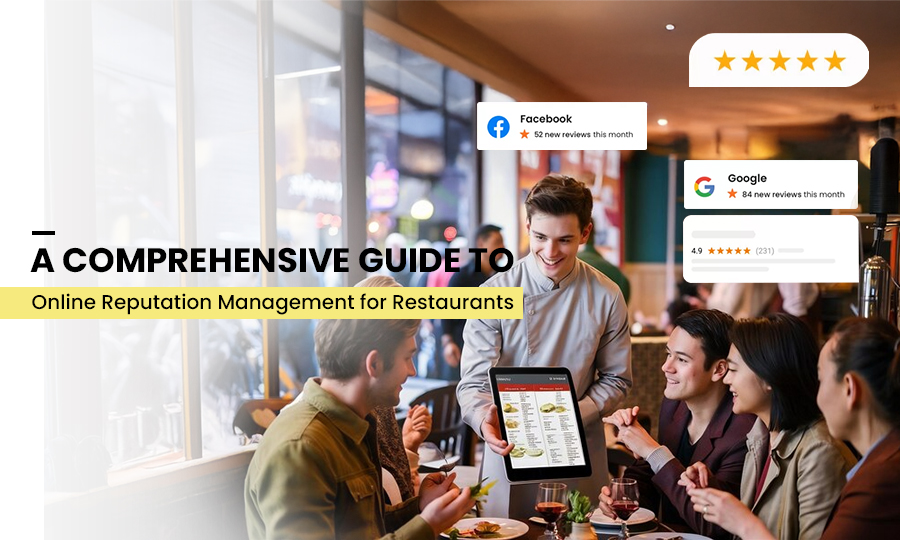In the ever-evolving hospitality sector, multiple startups and small restaurants are struggling to establish a strong online presence and get noticed by prospective customers. This is where reputation management for restaurants gets highlighted.
Negative customer feedback is the worst nightmare for every restaurant, as it can drive away customers, ultimately leading to reduced sales. According to a study in 2023, 98% of customers are most likely to read online reviews before making a purchase. By maintaining a positive reputation, restaurant owners can not only get more positive reviews but also increase both website and foot traffic.
If you are a restaurant owner who is looking to establish a positive online reputation for your business. Then this article is for you. It will discuss what reputation management is, why it matters, tips you must consider for effective restaurant reputation management, benefits of a successful online reputation in the restaurant industry, and more. So let’s get started.
What is Effective Reputation Management?
Online reputation management is the process of keeping track of and influencing how an individual, group, or business is viewed on the Internet. This process is basically used by businesses and individuals to nullify negative sentiment and promote positive sentiment. It usually involves responding to negative reviews, suppressing unwanted and detrimental search results, managing your online conversation, closely monitoring your online presence, and rectifying misinformation about your business.
In contrast to PR, reputation management focuses on defending your business reputation rather than building a good brand image. Effective reputation management is crucial as it can help you make sure customers view your brand positively and gain interest in engaging with you.
Benefits of Successful Online Reputation Management For Restaurants
Here are some of the top benefits of effective restaurant reputation management.
- Enhances Brand Perception
Your reputation is what influences the audience’s perception of your brand. Establishing a robust reputation management for restaurants is crucial for setting a business apart from its competitors. This can ultimately help you attract new customers and boost your brand value. In contrast, a negative reputation can severely affect your brand reputation and might drive away your potential customers.
- More Foot Traffic
Most customers conduct thorough research on a restaurant before visiting it. So, having more than 4-star reviews on platforms like TripAdvisor, Yelp, Google, and more is crucial to boost your restaurant’s reputation and credibility. This will make your business a favourable choice for new customers.
- Foster Trust
A positive brand image fosters trust and credibility among potential customers. This increases the chances of them selecting your products or services over others. Through effective reputation management, you can build a sense of trust and long-term connections with your customers.
- Higher Online Visibility
Positive reviews and regular engagement with customers can boost your likelihood of appearing in local searches on Google’s search results. Suppose someone searches for “best Italian restaurants near me” and your restaurant appears at the top of the Google search. This is exactly what effective reputation management does for your business.
- Helps Deal With Negative Reviews
Negative reviews can be disheartening and can damage your brand reputation in one go. However, having a strong online presence can turn the tables. By focusing on customer satisfaction, you will not only be able to retain your existing customers but also attract new ones.
- Builds Social Proof
A constant flow of positive online reviews, positive feedback, and client testimonials on social media serves as a social poof for prospective diners. Having a strong restaurant reputation management can make your diners feel confident in choosing your restaurant, knowing other customers have had a great dining experience with you.
- More Mentions and Exposure
Encouraging your customers to leave their valuable reviews on various review platforms, post about their experience with you on their social media accounts, or tag your restaurant can help you increase your reach and get noticed by local audiences. The higher the positive exposure, the more likely it is for people to remember your business when choosing a place to dine.
- Influences Purchasing Decision
According to a study, 59% of customers check more than two review sites before making a purchasing decision. If your restaurant has a positive online reputation and loads of positive reviews on websites like Yelp, Zagat, and Uber Eats from real customers, you can easily ace the game.
- More Reservations
Higher online ratings, more guest reviews, and appealing social media accounts can enhance the number of bookings on various platforms such as OpenTable, Uber Eats, and more. A positive restaurant reputation management can help diners feel at ease while choosing your business.
- Stay Ahead of the Curve
Effective reputation management for restaurants can help them stay ahead of their competitors. Your restaurant’s reputation is crucial. By responding to your restaurant reviews and addressing your customers’ concerns, you tell your customers that you highly prioritize guest satisfaction. This helps you stay ahead of your competitors who are not giving enough effort to address their concerns.
Tips for Effective Restaurant Reputation Management
Now that we know what reputation management is and why it is crucial for restaurants. We will now discuss some of the effective tips that restaurant owners can follow to establish a solid restaurant reputation management.
- Build Up Your Business Profile
Approximately 77% of customers check a restaurant’s website before ordering in or ordering out. Failing to have a strong online reputation can make your restaurant lag behind your competitors. Make sure to build a proper business profile with relevant information on various review sites, including Yelp, Facebook, Instagram, and more. So, when customers go through your business reviews, they find accurate insights that you want them to see, including contact number, location, photos, operation hours, and more.

From a visitor’s perspective, your website should be precise and engaging. You can do this by ensuring that your website is up-to-date, has a quick loading speed, is easily navigable, and is properly optimized for search engines.
- Encourage More Positive Reviews

Usually, diners choose restaurants based on positive reviews. However, regularly bothering your customers to leave positive reviews on your website can annoy them. But, when they have recently bought your products or services and are satisfied with them, you can politely and gently ask them to leave their valuable reviews. According to statistics, 70% of customers are likely to leave online reviews when asked.
You can use several ways to ask your customers to leave reviews, including SMS, Push notifications, email, and many more. The more positive reviews you encourage your customers to leave, the more helpful it will be to remove or suppress negative feedback and improve your average ratings across various platforms.
- Respond to Negative Customer Reviews Promptly and Professionally

Make sure to actively monitor online reviews. This will allow you to easily deal with negative feedback. This is one of the most important aspects of reputation management for restaurants. It not only offers a great opportunity for satisfying your unsatisfied guests, but it also makes your prospective customers feel that you value your customers’ opinions.
Responding promptly yet professionally to negative online reviews on various online platforms like Yelp, Google Reviews, and TripAdvisor makes your potential customers believe that you take mistakes seriously and genuinely value customer satisfaction. This is an essential part of restaurant reputation management and is quite a tough skill to master.
- Engage With Customers on Social Media Platforms

Nowadays, social media platforms have been rising in popularity. More and more customers are turning to social media to engage with businesses. Start by figuring out where your customers are. Find out the most suitable social media platform that can help you reach the right customers, and establish a robust online presence on those platforms.
Respond to every comment, query, and message instantly, this can help you increase your profile’s reach. Make use of these platforms to share engaging social media posts and content to make your customers connect with your business. Doing this will make your prospective customers engage with you.
- Respond to Every Social Media Mentions
Social media is a powerful platform where customers can share their real-life experiences, both positive and negative. By keeping track of social media for mentions of your restaurant, you will have an idea of individuals who are showing interest in your business and individuals who are sharing their negative experience with you.
When you see someone mentioning your business on social media, you should promptly and personally respond to them. If you ever come across negative feedback about your business, it is better to discuss it with them personally. This way, you will easily be able to figure out what upset them while also maintaining a positive brand image.
- Use Customer Feedback and Testimonials
It is one of the most important aspects for effective reputation management for restaurants. A little self-promotion won’t hurt. By focusing on positive reviews and testimonials, you will be able to effectively build customer loyalty and authority among your customers.

You can even create a section on your website for showcasing your success stories, and the positive dining experience of your customers can drive more traffic to your website. How? Customers often turn to reviews when they are planning to buy or get something. If they see reviews and testimonials from real people, they are most likely to engage with your business.
How Can Negative Feedback Affect Your Restaurant’s Online Reputation
When customers are unhappy with your services, it is most likely to change the whole perception of your business to them. According to this statistic, 96% of customers will leave your business for bad customer service. And if they share about it on their socials and other online platforms, others will know about the bad experience they had with your business. This can lead to a huge drop in sales. Here are some ways in which negative guest feedback can hurt the online reputation of your business.
- Threaten Your Online Reputation
Similar to word-of-mouth, real-time feedback has the same potential, both positive and negative. When your potential guests read bad reviews from customers you have served, it can make them lose interest in your brand. This can eventually pose a serious threat to the online reputation of your business.
- Drive Customers Away
If a customer takes their time to write a negative review, know that it has really upset them. If in this case you fail to respond to their reviews, it will make them believe you don’t care about your customers’ sentiments. Negative reviews will not only drive away your potential customers but also make your existing customers lose their trust and faith in your business.
- Lead to Financial Shortfall
With more and more customers turning away from a business that either has very few reviews or a lot of negative reviews, this can lead to a huge financial loss. According to a study by Harvard Business School, even a 1-star increase on Yelp can boost 5-9% of revenue for businesses. Through efficient reputation management for restaurants, you will be able to not only suppress negative feedback but also prevent financial losses.
How to Deal With Negative Reviews
In this digital age, more and more diners are turning to reviews when they are planning to dine out. However, they are most likely to lose interest in a business if it has more negative reviews than positive ones. This can severely damage the online reputation of your restaurant. Don’t panic because of these reviews, as they can offer a great opportunity to improve your customer service. Here are some of the most effective ways to deal with negative reviews and turn them into positive experiences.
- Keep Track of Your Online Reviews
For managing your restaurant’s reputation effectively, you need to closely monitor your online reviews on various review sites. You can leverage multiple restaurant reputation management software to effectively manage your online reviews. These tools can caution you regarding any kind of reviews and help you maintain a positive reputation online. In case you don’t have these tools, you can simply monitor online reviews on review platforms like Yelp and Facebook.
- Understand The Issue
In order to solve the problem, you need to identify the issue first. Observe the type of negative response you are receiving and figure out the underlying issue. Another way to understand the issue is by reaching out to the customers who have left negative remarks personally and asking them about their concerns.
- Respond to All Negative Reviews
If you want to establish a powerful restaurant reputation management, this is one of the major factors you need to consider. Make sure to respond to every negative review you receive as soon as possible. It is best to respond to both negative and positive reviews simultaneously, as it can help foster trust among customers. If it was a mistake from your end, apologies sincerely. Consider the person’s negative experience and let them know their opinions are heard, and you will address the issue as soon as possible.
- Ask Happy Customers to Leave Their Reviews
The more reviews your business receives, the better. However, you need to make sure those are positive. Collect reviews from the customers who are satisfied with your products and services. Encourage them to leave their valuable reviews, as they matter a lot. When your prospective customers see positive feedback from real customers, they are most likely to trust you, resulting in increased sales.
- Top Online Review Sites For Restaurants
Here is a list of the top 4 online review sites that restaurant owners can consider to attract prospective customers and retain the existing ones.
Yelp
- It is one of the most favored review sites. It is highly preferred for its user-friendly online listings, which showcase relevant information about a business, including business photos, ratings, and reviews.
- For effective reputation management for restaurants, this site enables business owners to reply to their customer reviews, which helps to foster solidarity and manage feedback effectively.
TripAdvisor
- This site is quite popular among travelers and tourists seeking a good dining experience. It provides reviews from visitors from across the world.
- This site is great for restaurants that are located in high-traffic areas and those trying to engage an international audience.
- This application enables users to connect with a business directly on social media, allowing faster responses and higher engagement.
- It blends easily with other marketing efforts, making it an ideal platform for fostering long-term connections and loyalty.
Google Reviews
- This comes with Google Maps, which makes it highly convenient for anyone looking for local restaurants.
- Ratings and reviews appear directly in search results, making high ratings important for enhanced visibility.
How Can A Reputation Management Company Help Managing Your Restaurant’s Reputation
Restaurant reputation management simplifies the process of managing your restaurant’s reputation and helps you enhance your brand visibility. However, if you don’t have the required knowledge in reputation management, you will end up messing up. Partnering with a reputation management company can significantly help you by effectively managing your restaurant’s reputation. They do this by keeping a close track of your online conversations, identifying and addressing negative reviews, and creating positive content.
- Online Monitoring
These agencies bring hands-on experience and utilize smart tools to closely monitor social media news, the online reviews of your business, and blogs for mentions of your business.
- Sentiment Analysis
Sentiment analysis is the most crucial step you need to take to establish a positive online reputation for your restaurant. By analyzing positive, negative, and neutral sentiments of online conversations to understand how the public is viewing your brand, these agencies develop effective reputation management strategies for restaurants.
- Removal of Defamatory Content
By helping your business to pursue the removal of false and damaging content from online platforms and various review sites, these companies help establish a clean and positive reputation management for restaurants.
- Positive Content Creation
These agencies create and promote high-quality, positive, and engaging content such as blogs, social media updates, press releases, and more to showcase your business’s biggest strengths and values.
- Social Media Management
Effectively engaging with your customers on social media can open the door for higher foot traffic as well as online traffic. These agencies engage with your customers and followers on social media on your behalf to foster stronger relationships and address concerns.
- Responding to Reviews
As a part of their review management process, these companies specialize in drafting professional and relevant response templates for both positive and negative reviews, showcasing that your brand is responsive and values its customers.
Conclusion
Reputation management for restaurants is quite a lot of work. Managing your negative reviews and protecting your restaurant’s online reputation is a tough job and requires a lot of patience, strategy, and genuine dedication to customer satisfaction. According to studies, 93% of customers are likely to repeat a purchase with a company that offers excellent customer service. By following the above-mentioned tips, you can not only effectively manage the online reputation of your brand but also boost your online visibility. By monitoring your online ratings, responding instantly yet professionally, using negative feedback as an opportunity to improve, and encouraging more reviews, you will not only eliminate the impact of negative reviews on your business, instead use them to improve and strengthen your business’s online reputation. In case you are just starting out and have no idea how to do it, you can perhaps consider hiring an expert online reputation management agency.

